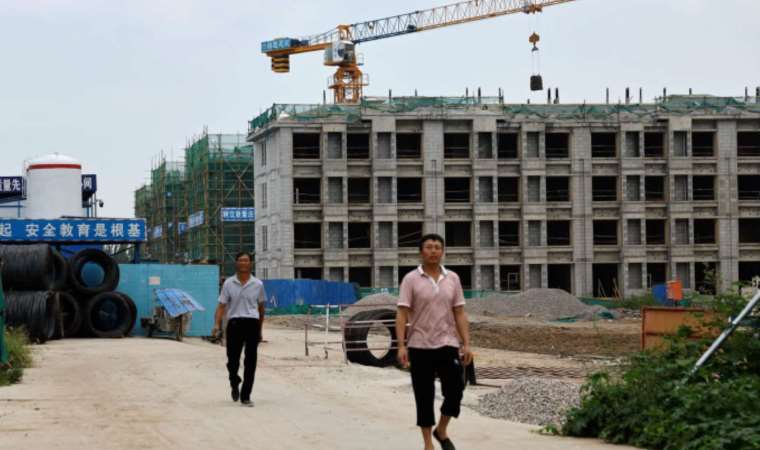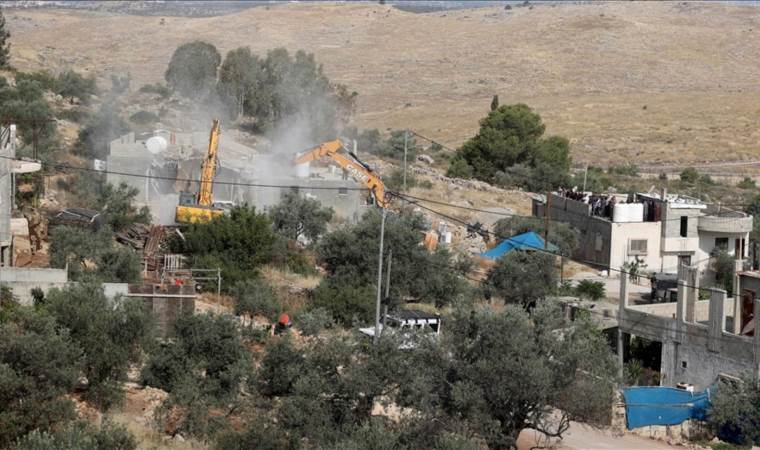Workers without pay, quiet sites: China's property woes hit Country Garden
At a partially constructed residential complex belonging to Country Garden on the outskirts of Tianjin, a major northern Chinese metropolis, construction activities have slowed to a barely audible hum, with only a few idle workers wandering around a largely deserted site.

A worker named Wang, aged 50, shared his concerns: "They haven't paid us since Chinese New Year in January. We are all worried," he mentioned. He also revealed that he ceased working at the Yunhe Shangyuan site just last week.
These two sites in Tianjin, a bustling port city situated about 135 kilometers (84 miles) southeast of Beijing, were visited by Reuters on a Friday. Both of these sites are under the management of Country Garden, which, before this year, was China's largest developer in terms of sales volume but is now entangled in a debt crisis that threatens to affect the broader economy.
Construction had either entirely ceased or significantly slowed at both locations. The larger site displayed a few rows of unfinished five-story apartment buildings, while the other had motionless cranes and extensive green scaffolding enveloping incomplete high-rises. Workers residing in dormitories on these sites voiced grievances about months without pay.
A worker surnamed Wei, also in his 50s, expressed his predicament: "I'm under a lot of pressure." He added that he had received only a one-time living stipend of 4,500 yuan ($618) so far this year. "I have a wife and a child who's about to return to school, as well as elderly parents... Workers can't make ends meet with this."
Once regarded as one of the more financially stable developers, Country Garden now serves as an indicator of the changing fortunes of developers in China. Its financial struggles have contributed to the debt crisis in China's real estate sector, which accounts for approximately a quarter of the world's second-largest economy, currently experiencing a slowdown due to a housing slump and weak consumer spending.
A spokesperson for Country Garden's Yunhe Shangyuan project, in a Wechat statement, asserted that all "registered employees" were receiving their pay.
Regarding the Yunjing Huating site, the government had ordered a construction suspension in June to rectify management issues, as stated by a project representative in a separate statement to Reuters. The site has since passed inspection, and work is expected to resume next week, with no impact expected on the targeted completion date of October 2024. The representative noted that some workers were not employed directly by the developer but by its contractor, who "has promised to pay the workers' wages by the end of this month." Unfortunately, calls and emails to the project contractor, Shenyang Tengyue Construction, went unanswered.
The housing ministry declined to comment on Reuters' inquiries concerning the general suspension of construction in the property sector or specific queries about Country Garden.
Country Garden is faced with the task of completing nearly 1 million homes, according to estimates from Japanese investment bank Nomura. The company has not publicly acknowledged any construction halts due to financial constraints.
In an exchange filing on August 10, Country Garden stated its commitment to "spare no effort to ensure delivery" of apartments and "ensure the operation of projects nationwide" for the benefit of home buyers.
Country Garden achieved success by rapidly selling numerous units with slim profit margins and promising "five-star living" in less popular, smaller cities.
Gao Fei, the investment advisory manager at the Tianjin branch of Centaline Property Agency, mentioned that Tianjin hosts about a dozen Country Garden projects, with most having been completed and delivered. Gao also noted that halted construction projects were "relatively rare" in the city, comprising roughly a dozen out of 300 sites for sale. However, he acknowledged that there were projects with slowed development progress, explaining, "In China, it is a common phenomenon because now all developers control the rhythm of construction based on the sales rate... so once sales slow down, so will construction," Gao told Reuters.
Confidence in the real estate sector took a significant hit last year when many Chinese homebuyers threatened to stop repaying mortgages due to developers halting the construction of pre-sold housing projects, primarily because of financial constraints and stringent COVID-19 restrictions.
China's real estate market experienced a slight rebound in the first quarter of 2023, but transaction volumes have since declined, with most city housing markets remaining in a "depressed" state, as noted by Gao. He further commented, "We have seen that many home buyers are affected by a lack of income, and their home buying choices and what they can afford have been impacted in turn."
Most Read News
-
 No Future Without Industry: A Call for Production-Orient
No Future Without Industry: A Call for Production-Orient
-
 Israel’s Ben-Gvir ends US visit amid pro-Palestine prote
Israel’s Ben-Gvir ends US visit amid pro-Palestine prote
-
 Japan seeks collaboration to advance nuclear disarmament
Japan seeks collaboration to advance nuclear disarmament
-
 Major fire erupts at electrical substation in West Londo
Major fire erupts at electrical substation in West Londo
-
 Ukraine appoints new deputy defense ministers amid ongoi
Ukraine appoints new deputy defense ministers amid ongoi
-
 Malaysia urges all parties in Myanmar to continue ceasef
Malaysia urges all parties in Myanmar to continue ceasef
-
 German Social Democrats conclude key vote on coalition d
German Social Democrats conclude key vote on coalition d
-
 Canada's Liberal Party wins federal elections by over 43
Canada's Liberal Party wins federal elections by over 43
-
 At least 41 civilians killed, scores injured in RSF shel
At least 41 civilians killed, scores injured in RSF shel
-
 Israeli army arrests 22 Palestinians, demolishes 4 homes
Israeli army arrests 22 Palestinians, demolishes 4 homes










